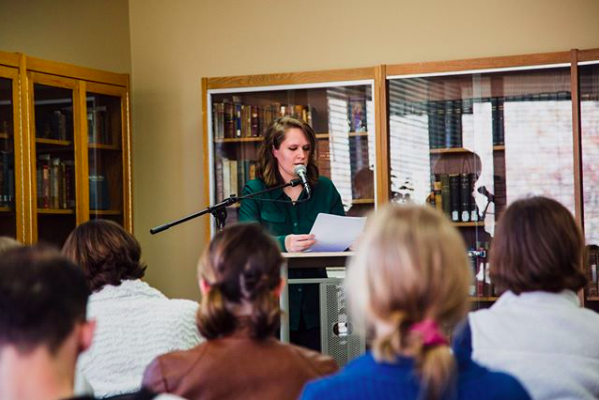Earlier this month, college authorities released eager students into the chapel in groups of ten to scramble for seats to the most glamorously-decorated Mountain Affair stage ever.
Covenant College’s 17th annual Mountain Affair on October 11 flaunted 8 songs, 1 dance, and 1 spoken word performance. This year, students themselves were given the opportunity to vote for the winner and runner-up.
Photos by Eden Anyabwile
The grand prize of $1,000 was presented to Hannah Wade ’22 (Kaleidoscopic Kiwi). $750 went to Armon Butler ’21 (Barcari), the runner-up. The Director’s Choice Award went to Diamonds of Dust (Hope Merrill ’21, Mary Streets ’22, Marie Bowen ’20, Lucy Green ’20, and Leslie Hill ’21), and Judges’ Choice to Dook Walt Jr. (Jacob Brown ’21, Luke Bolton ’22, Cooper Twit ’22, John Hooker ’21, and Jono Kaufmann ’21).
“We believe that it will be the best Mountain Affair in the history of the whole world,” said Kathryn Wieldraayer in an email leading up to the event.
Upgrades included food trucks, Mountain Affair t-shirts, and a production team from Nashville called CMC (Contemporary Music Center), which arrived with two truckloads of equipment.
Also for the first time, judges Nesha Evans, Matt Brown, and Ben Vanderhart offered comments immediately following each performance. Both Vanderhart (Rock Creek worship leader) and Brown are Covenant graduates and previous Mountain Affair winners.
Fiona Glaser ‘20 and Caleb Keitt ‘20 had the honor of being this year’s hosts.
Glaser said she knew she’d be a great fit, having dreamt about hosting since freshman year. She appreciates how Mountain Affair takes talents of students “down in Catacombs strumming their guitars in the dark,” and provides them with production teams, equipment, and an eager audience, while describing the four nights of practice as “super intense.”
“I am so excited about so many acts,” she said beforehand.
“Every single act put in so much work,” said Keitt, whose love of people and entertainment motivated him to host. Keitt grew up inspired by Nick Cannon of America’s Got Talent, and thanks his audience for the opportunity to serve.
Nesha Evans was honored to be judging. Having competed in Miss America preliminary pageants for six years, Miss Land of Lincoln 2003 also has experience judging pageants. Evans grew up inspired by the performances of her mother. As soon as she was old enough, Evans took dance, acted in plays, and sang in choirs. This Friday, however, was her first Mountain Affair.
“I’m super duper excited… It’s an opportunity for students to showcase the talent that God has given them, and to do it excellently, and hopefully for His glory. So, how could you not be excited about that?”
Clearly, students were energized. Thursday night, roughly a dozen brave representatives of their halls slept under the stars as placeholders in front of the Chapel doors, not only getting caught in the sprinklers at 7 am, but enduring three separate attacks from various halls of Carter and Founders around 11:30 pm, including thrown fruit, tin cans, and glitter.
Earlier in the day, Golden Joe & The Suggins Gang singer Sloane Hopkins ’23 admitted she didn’t know how serious of a commitment she had made. “As a freshman, to be welcomed into this long-standing tradition, I feel very honored … I thought it was just like really chill. And it’s not chill. It’s amazing.”
She loved seeing the whole campus participating, and was honored about all the excitement, expressing thanks to all those “jazzed” about Mountain Affair.
Runner-up Butler lost his best friend Elijah about a month ago, and described his writing process for the single, “Black on Black.” “I found out the news that night, and I just stayed up and I wrote it for him, and after the show, I just broke down, man, because it was so inspirational for me, and just seeing people react to the song, all glory to God, man. I couldn’t ask for a better experience.”
Diamonds of Dust lead singer Merrill expressed her love of Mountain Affair before the performance, explaining that “A Work in Progress” had in fact been an ongoing project since freshman year.
After expressing plans to raise her score by five points, Merrill’s high school archery coach laughed at her, remarking later at a sports banquet, “Hope sets her goals a little too high, and you can ask her if she reached those goals or not.” The painful influence of those words caused Merrill to doubt her musical ability when she arrived at Covenant.
She says of the song, “It’s about pushing back against all of the doubts and all of the people who have told me, ‘you’re not gonna do this.’”
After the win, vocalist Bowen expressed her gratitude. “This was kind of a dream come true, to get to sing this song, on that stage, with those musicians.” Bowen was excited to be a part of Merrill’s process, and thanked the Lord first and foremost. “It was such a gift to get to glorify God through the gifts He’s given us.”
Jacob Brown, Dook Walt Jr. lead singerand Judges Choice Award winner, was glad everything came together. He said the band had decided on a weird intro, and incorporating a Bach piece is what led to their vintage white blouses, ultimately giving them the idea to display nature-heavy video game landscapes. “It was just kind of a way to spice it up, be weird, be dumb, and I think it worked out really fun.” The main goal of the band is to not be predictable at all, Brown said. Dook Walt Jr. hopes to release a single on November 1st, and will be playing at Freezefest on November 2nd in Nashville.











